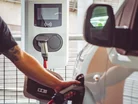Mer gives logistics operators a free guide to EV charging

The logistics portion of the supply chain is next to fulfil its decarbonisation requirements and adopt electric vehicles (EVs) as sustainable alternatives to conventional trucks.
Such a transition is not without risks, but the EV charging infrastructure specialist Mer is working to help fleet operators take on the shift to electrified propulsion options. Across the board, the key point holding companies back from all-electric vehicles is education, which is why the company devised a new report—an electrification guide for logistics managers.
As commented by Natasha Fry, Mer’s Head of Strategic Accounts—who also co-authored the piece, “delivery fleet managers are very data-driven when it comes to identifying which vehicles can be electrified and the best way to optimise those assets.
“However, they need to start taking the same analytical approach to the charging infrastructure and planning for how vehicles will be charged, how much power it'll require and establishing where that power comes from.”
Fry also explains “final mile fleets are among those driving electrification and many have set ambitious goals to go even further. But without a true understanding of the power availability at each depot, and the cost implications of upgrading those grid connections, their roll-outs of EVs risk being delayed while budgets are revised upwards.”
Mer’s charging infrastructure business and insight
The aim of the business is to ensure reliable charging for all, both in a residential and consumer setting as well as in the commercial arena.
Mer has more than 10 years’ experience in the field of EVs and continues providing expert advice to organisations, including local authorities, commercial landowners, fleets, workplaces, and homeowners.
The free guide provided by Mer will educate readers on the importance of charging and energy capacity in setting goals for electrification, and how these will drive future adoption efforts.
Further measures covered in the EV guide include:
- Identifying whether fast or rapid chargers will best suit a last-mile operator’s needs
- Managing the procurement process
- Getting installation right first time
- How to minimise charger downtime for mission-critical EVs
“Upgrading your grid connection comes at a price and takes time,” says Fry.
“But, understanding that in the early stages means you go into it with your eyes open. Some last-mile logistics operators will be prepared to increase budgets to meet existing targets, while others might prefer to take a phased approach.”
Logistics operators can view the full guide HERE.
Fry says: “To run an effective last-mile logistics business, data is king. Being armed with the right information on EV charging will ensure you make evidence-based decisions on electrification, rather than make costly mistakes.”

